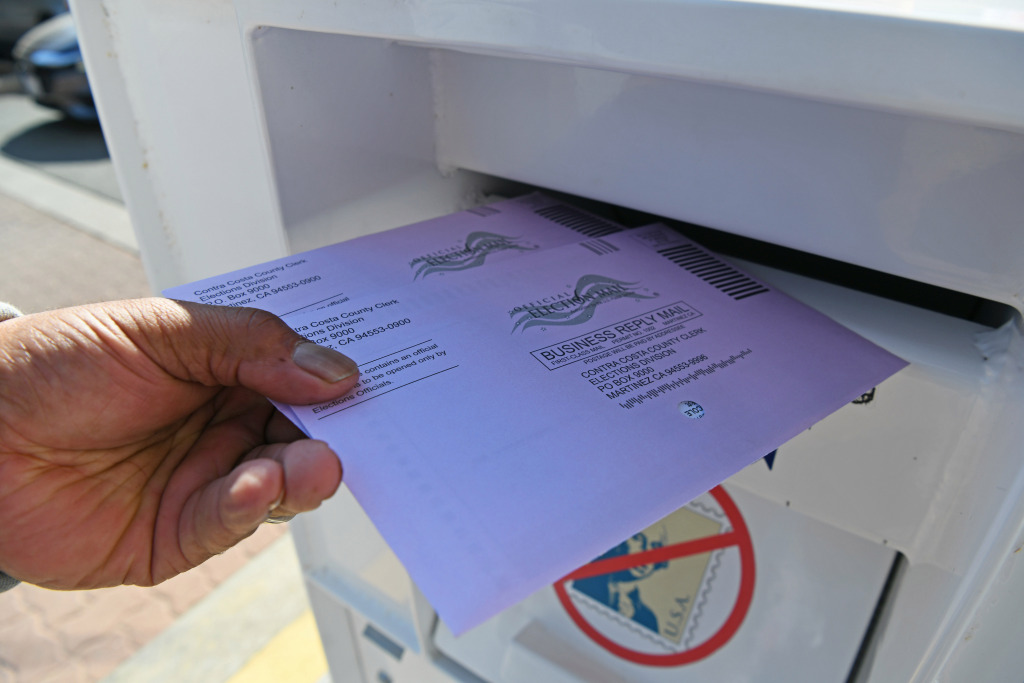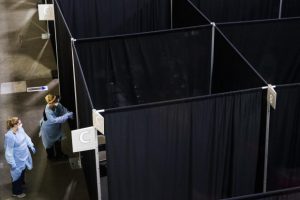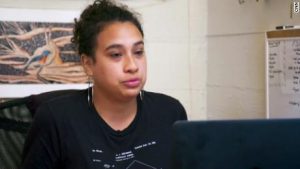EAST PALO ALTO — Antonio De Jesus Lopez stood outside St. Francis of Assisi church on Bay Road until the polls closed on Election day, hoping he could get the last few votes to eke out a win for one of three open council seats.
Dressed in jeans and a Guayabera shirt, Lopez did what he had been doing for the past several months: passing out leaflets, pamphlets, and most importantly talking to people to make sure they knew his name. He may not have done this before, but as a native East Palo Altan he knew people there vote late.
“You would’ve seen me electioneering at the very last minute to those who came to the polls to vote late,” Lopez said. “There was lots going on that day. A soccer club was having practice, people were going to church. I was bombarding people with ‘vote for me’ and ‘here’s your polling location’ for those last few votes. Everything counts.”
On election night it appeared the votes just weren’t there for the 26-year-old Stanford PhD candidate and writer to win a seat on the East Palo Alto City Council. After running a campaign on progressive policies, he was ready to accept defeat against his closest opponent Webster Lincoln, a community leader.
But as happened with several other young progressives and self-described socialists who ran against incumbents and heavily-financed opponents across the Bay Area, Lopez won with late votes reported after Election day.
“Don’t let anyone tell you a vote doesn’t matter,” Lopez said. “That’s a frickin’ lie.”
All across the Bay, socialist and progressive young people like Lopez led insurgent campaigns for local elected positions and won, including several against sitting council members and established community leaders that led to upsets.
From Redwood City to Oakland to South San Francisco, grassroots campaigns brought together tenant activist groups, unions and local community movements and elected firmly left-wing candidates who promised to bring socialist and progressive ideas to city councils that have fallen out of favor with many low-income people facing difficult material realities in increasingly more gentrified communities.
The Democratic Socialists of America supported the election of 25-year-old Alex Lee, the youngest state assembly member in decades and 24-year-old Lissette Espinoza-Garnica, the first non-binary person to serve in elected office in the Bay Area.
In Redwood City, DSA-backed Espinoza-Garnica — firmly a prison and police abolitionist — beat out incumbent Janet Borgens on a campaign that courted voters by connecting with them personally and grasping their deepest economic anxieties.
Flashy mailers, costly ad campaigns and highly-sought-after endorsements were never part of Espinoza-Garnica’s campaign goals, she said, something other candidates interviewed agreed would have been a losing strategy in an election year defined by name recognition and socially-distant voter engagement.
Instead Espinoza-Garnica and others employed the same techniques that socialists and progressives are using to get elected across the country: phone-banking, literature drops, door-knocking and speaking to people’s material needs.
“We weren’t trying to combine our ties with Zuckerberg, or the Apartment Association or some other special interest,” Espinoza-Garnica said of her campaign. “We were trying to talk to people without any for-profit ties and that really earns people’s trust in this community.”
The same grassroots strategy Espinoza-Garnica employed also made waves in the East Bay, where DSA-endorsed Carroll Fife — a member of Moms 4 Housing, a collective of unhoused and insecurely housed mothers in the city — upset an establishment candidate for an open Oakland city council seat with the help of 700 volunteers.
She won the seat just months after becoming a national sensation for squatting in an empty West Oakland home in protest of real estate speculations that they say drive up housing prices, leave homes vacant and exacerbate the city’s homelessness crisis.
Inspired by the campaigns of Vermont Senator Bernie Sanders, New York Congresswoman Alexandria Ocasio-Cortez, Minnesota Congresswoman Ilhan Omar and other left-wing figures, candidates running for seats on the Peninsula wagered that their victories could be replicated at the local level.
Despite Sanders’ loss in the race for the Democratic Party nomination, newly elected South San Francisco council member James Coleman, 21, and other progressives said people are still yearning for his policy positions like Medicare for All, social and public housing, bolstering the union movement, advocating for workplace democracy and expanding access to life-saving services supporting low-income people.
After the police killing of George Floyd, Coleman said voters also are looking to young people for leadership, especially those who made up a large part of the massive anti-police brutality demonstrations that shook the Bay Area this year. He said people like Espinoza-Garnica and himself have “broken the ice” for other people to follow suit.
“Similar to how Bernie inspired AOC and AOC inspired me, I think we’re going to be seeing so many more candidates who are young and leftist like we are,” Coleman said. “A lot of the message that we’ve received were people who were queer, young, leftist throughout the country who said that ‘wow, thank you for showing me this is possible.’”
Espinoza-Garnica — who had been a member of the Silicon Valley DSA chapter for years — said her election and that of others like her is a testament to voters’ frustrations with current elected officials and their willingness to support ideas that would have been ridiculed just years ago.
She said elected officials on the Peninsula “pose as progressive” but “have nothing to back it up” while young brown and Black candidates running on socialist platforms have messages that marginalized people respond to and want. As a warning to other incumbents across the Bay Area, Espinoza-Garnica’s already planning to coach and support candidates like her to oppose them on left-wing platforms.
That’s the same strategy that Silicon Valley DSA spokesman Johannes Muenzel said the chapter is focused on for the near future. The local South Bay chapter of the national organization — which boasts nearly 100,000 members — endorsed six candidates, with just two losing out. Muenzel said voter engagement was key.
“We see this as a first step,” Muenzel said. “The really important thing to us is we start reaching people again as socialists. People only get to hear a very limited set of perspectives. If we had more Democratic Socialists in office people would’ve heard a different message over the years.”
But there’s only so much elected officials can do, Muenzel said. Socialist politics go beyond election-focused organizing or a single candidate’s campaign, he said.
“What’s key to us is certainly that we’re proud of our electoral bent but politics doesn’t stop on election day,” Muenzel said. “Politics happens when a landlord evicts you for not paying rent; politics happens when a boss lays someone off in the middle of a pandemic; politics happens when there’s homeless people sleeping on the streets. We need to break this limited view of what we can do politically and start organizing every day. There needs to be an awareness of class struggle, not red vs. blue.”



















